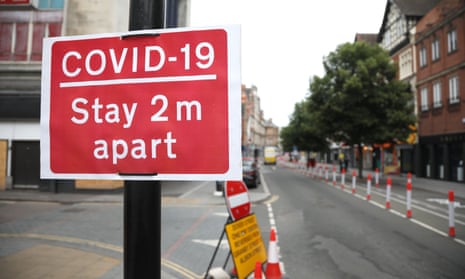Specially tailored public health messaging, the impact of structural racism and whether healthcare workers should be redeployed are among research projects that have been given funding to explore the link between Covid-19 and ethnicity.
More than £4m has been awarded to six projects that will help researchers explain and mitigate the disproportionate death rates from coronavirus among people from black, Asian and minority ethnic (BAME) backgrounds.
The grants are from UK Research and Innovation (UKRI), and the National Institute for Health Research (NIHR).
One of the projects, which receives £371,000, aims to design culturally relevant health messages for minority communities. The study, led by Prof Aftab Ala, the Royal Surrey NHS Foundation Trust, and Kings College hospital, comes amid concern that cultural and language barriers in accessing health could have contributed to the rise in coronavirus infections in Leicester.
Similar concerns over language issues were raised earlier in the coronavirus pandemic. Infection rises in certain areas were linked to certain communities and age groups potentially not fully understanding the government guidelines and rules on social distancing.
Almost half (£2.1m) of the £4.3m funding pot will go to a study into BAME healthcare workers, led by Dr Manish Pareek, from the University of Leicester.
Pareek said: “Some of these questions will get uncomfortable perhaps for people in authority, but we’ve been funded to ask a question and I think it’s important that we address all aspects.
“Do people feel that they’ve been asked to do certain roles or work in roles that they haven’t previously [during the pandemic]? Do people feel that they’ve got the necessary protective equipment, etc?
“I think that’s where we may get some very rich information, and the NHS Confederation, who are partners, are very keen that we explore all of those issues.”
Using anonymised healthcare records of NHS staff, the study will try to ascertain which ethnic groups could be at particular risk, so as to help with advice whether staff from a particular background and age range should be redeployed away from the frontline.
The study will also recruit 30,000 (two-thirds BAME) doctors, nurses and ancillary staff, including porters and cleaners, tracking their mental and physical health, access to personal protective equipment and place of work.
A recent Public Health England report said 36% of healthcare workers who had died from Covid-19 were of Asian ethnicity, and 27% were black.
The government has been accused of downplaying structural racism as a cause of the disproportionate death toll among BAME communities but the researchers are keen to explore its impact.
A team led by Dr Robert Aldridge, from UCL (University College London), has been awarded £1.4m to recruit about 12,000 people from BAME groups to add to the 25,000 already in its “virus watch” study, previously funded by UKRI and NIHR. It will examine infection incidence among BAME communities and the contribution of factors such as overcrowding, migration status and occupation.
“One of the things that we’re concerned about in the migrant group in particular is barriers in access to healthcare and racism, structural discrimination, and whether that’s playing a factor,” said Aldridge. “Do they get a poorer level of care than both non-migrant minority ethnic groups and the white British groups?”
He said that the work would include examining the reduction in access to healthcare arising from the hostile environment.
The researchers said they would start publishing data and recommendations as soon as possible given the urgent need for action ahead of a feared second wave of the pandemic rather than wait until their studies were concluded.
Prof Dame Ottoline Leyser, UKRI’s chief executive, said the range of projects had been chosen “so that we can save as many lives as possible”.
